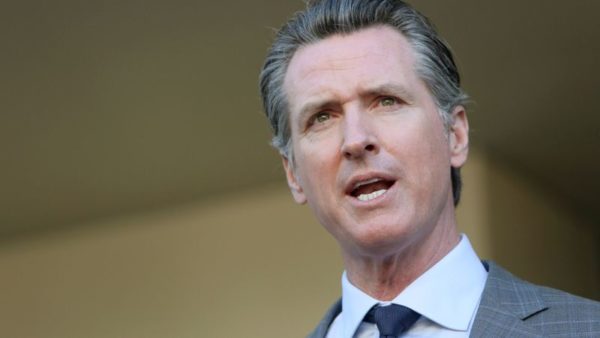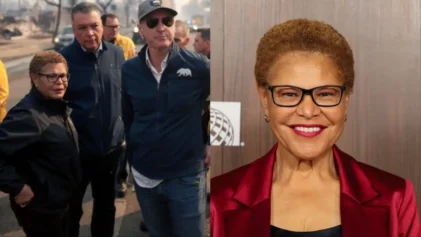Gov. Gavin Newsom (D-CA) made headlines last week after signing an executive order imposing a moratorium on the state’s death penalty. Citing wrongful convictions, the Democratic governor also ordered the closing of the death chamber at San Quentin State Prison.
“I cannot support that system,” Newsom told MSNBC’s Rachel Maddow on Friday, referencing California’s death row, the largest in the nation. “Seven hundred and thirty-seven human beings on death row.”

Gov. Gavin Newsom also pointed to racial disparities in the state’s executions, calling the racial skew “overwhelming.” (Photo: Dania Maxwell / Los Angeles Times)
The Golden State’s death row population isn’t just the largest in the U.S., but in the entire Western Hemisphere, the governor noted, adding that most inmates die of other causes before their scheduled executions.
Newsom announced the moratorium from the state capitol in Sacramento last Wednesday, calling the decision a culmination of “a 40-year journey” that started when he was just a boy, according to The Intercept. During his remarks, the former lieutenant governor also pointed to the racial disparities in state executions. Still, the risk of executing innocent people remained a paramount issue.
“You had someone just last year that was released from death row after serving 26 years in San Quentin,” Newsom told reporters, referencing the case of accused child rapist Vicente Benavides, who was exonerated in April 2018.
As reported by The Intercept, the governor’s order has no material impact on the nearly 737 people already condemned by the state, nor is it expected to prevent prosecutors from seeking the death penalty. “In this sense, Newsom’s announcement merely formalizes the status quo in a state whose death penalty system has come to be defined by disarray — [and] where no executions have been carried out in more than 13 years,” the newspaper states.
California performed its last execution in January 2006, when it put to death 76-year-old Clarence Ray Allen for the murders of three people. Allen, who arrived to San Quentin’s death chamber in a wheelchair, was the oldest inmate to be executed by the state.
Newsom’s decision also comes just a few years after California’s residents voted to hasten the death penalty. Proposition 66, a measure aimed at revamping state executions, passed by narrow margins in 2016, while Proposition 62, which sought to end the death penalty and replace it with life without parole, failed completely.
The California Democrat has long been in favor of abolishing executions, calling the practice of putting people to death “fundamentally immoral.” The rates at which Californians of color are sentenced to death has also been a major concern for Newsom.
“The racial skew is overwhelming,” he told Maddow. “Two thirds — doesn’t surprise anyone listening — of people on death row are people of color. About one-third have severe mental illness. As a judge said, lightning, it strikes some defendants and others it does not. But it strikes those people of color, and those that commit crimes against whites more than others.
“And those without wealth are more likely to end up on death row,” Newsom added.
National statistics from the Death Penalty Information Center showed that Black Americans account for 35 percent of inmates executed in the U.S. since 1976, compared to 8 percent of Latinos and 56 of whites. A state-wide study of the role of race, ethnicity and geography in California death sentencing published in 2017 also found that defendants who killed non-Latino whites are more than three times more likely to be sentenced to death than those who kill Blacks.
As of 2019, Newsom said he estimates that 4 percent of people on the state’s death row are innocent.
“We don’t think that, we know that,” he said. “That means I’m being tasked literally to exercise my authority to execute someone every single day for two years, knowing that it’s likely 30 of them that are innocent.”
Newsom now joins governors in Oregon, Colorado and Pennsylvania who’ve imposed moratoriums on executions in those states, The Los Angeles Times reports.
Watch more in the video below.

